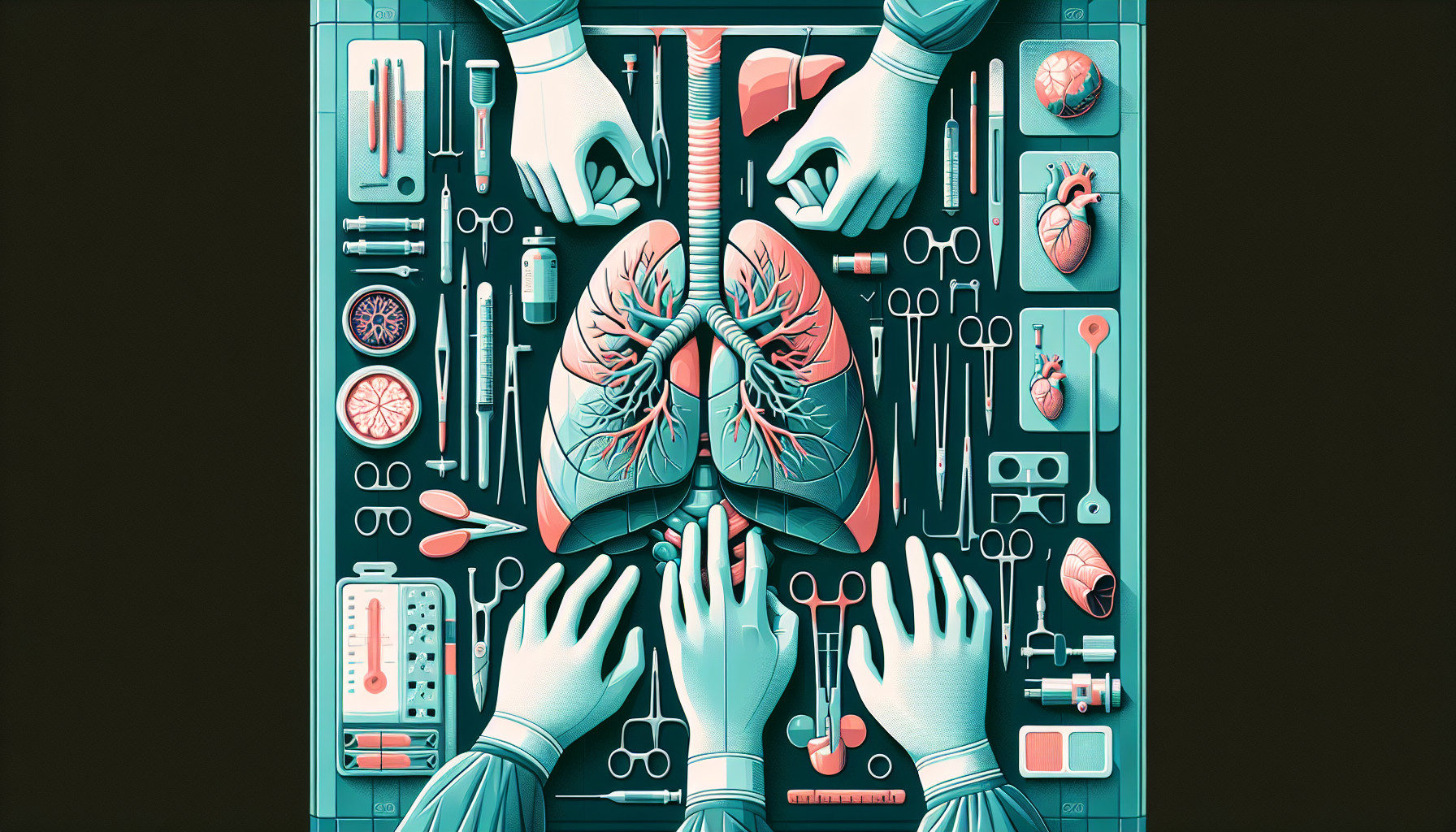Our Summary
This research paper discusses a treatment method for patients who have early-stage non-small cell lung cancer and also suffer from severe COPD and emphysema, which are lung conditions that significantly reduce lung function.
The standard treatment for this type of lung cancer is surgical removal, usually by taking out a lobe or segment of the lung. However, this requires the patient to have a certain level of lung function, which those with COPD and emphysema typically lack.
The study suggests that these patients could still be treated if they qualify for a procedure called lung volume reduction surgery (LVRS). This procedure can be performed at the same time as cancer removal. It not only confirms the cancer diagnosis and provides a complete picture of the disease’s stage but also offers the chance to improve lung function after the operation.
As with all potential cancer patients, the decision to proceed with this treatment should be discussed in a multidisciplinary tumor board.
FAQs
- What is the standard treatment for early-stage non-small cell lung cancer?
- How does severe COPD and emphysema affect the standard treatment for non-small cell lung cancer?
- What is lung volume reduction surgery (LVRS) and how can it benefit patients with both non-small cell lung cancer and COPD or emphysema?
Doctor’s Tip
A helpful tip a doctor might give to a patient undergoing lung resection is to quit smoking if they are a smoker. Smoking can greatly increase the risk of complications during and after surgery, as well as hinder the healing process. Quitting smoking before the procedure can improve lung function and overall health, making the surgery and recovery smoother. Additionally, maintaining a healthy lifestyle through regular exercise and a balanced diet can also improve outcomes after lung resection.
Suitable For
Patients who are typically recommended lung resection include those with early-stage non-small cell lung cancer, particularly those with severe COPD and emphysema that significantly reduce lung function. These patients may benefit from a combination of lung cancer removal and lung volume reduction surgery to improve lung function and overall outcomes. It is important for these patients to be evaluated by a multidisciplinary team to determine the best treatment approach for their specific condition.
Timeline
Before lung resection:
- Patient is diagnosed with early-stage non-small cell lung cancer and severe COPD and emphysema.
- Patient undergoes various tests such as CT scans, PET scans, and pulmonary function tests to determine the extent of the cancer and lung function.
- Patient is evaluated by a multidisciplinary team to determine if they are a candidate for lung volume reduction surgery (LVRS) in addition to cancer removal.
- If deemed eligible, patient undergoes LVRS and lung resection surgery simultaneously.
After lung resection:
- Patient undergoes recovery period in the hospital, typically staying for a few days to a week.
- Patient may experience pain, shortness of breath, and fatigue during the recovery period.
- Patient is closely monitored for any complications such as infections or bleeding.
- Patient undergoes pulmonary rehabilitation to improve lung function and overall recovery.
- Patient follows up with oncologist and pulmonologist for regular check-ups and monitoring of cancer recurrence and lung function.
- Patient may experience improvements in lung function and overall quality of life after the surgery.
What to Ask Your Doctor
Some questions a patient should ask their doctor about lung resection include:
What are the potential risks and benefits of undergoing lung resection surgery for my specific condition?
How will my COPD and emphysema impact my ability to undergo lung resection surgery?
Are there alternative treatment options available for my lung cancer that do not involve surgery?
How will lung volume reduction surgery (LVRS) be performed in conjunction with the cancer removal surgery?
What is the success rate of LVRS for patients with COPD and emphysema who also have lung cancer?
What is the recovery process like after undergoing lung resection surgery and LVRS?
How will my overall quality of life be affected by undergoing these procedures?
Will I need ongoing treatment or monitoring after the surgeries?
Are there any long-term effects or complications I should be aware of after undergoing lung resection surgery and LVRS?
Can you provide me with information about the multidisciplinary tumor board that will be involved in making decisions about my treatment plan?
Reference
Authors: Hiller A, Schneiter D, Opitz I, Caviezel C. Journal: Praxis (Bern 1994). 2022;111(8):457-462. doi: 10.1024/1661-8157/a003825. PMID: 35673842
